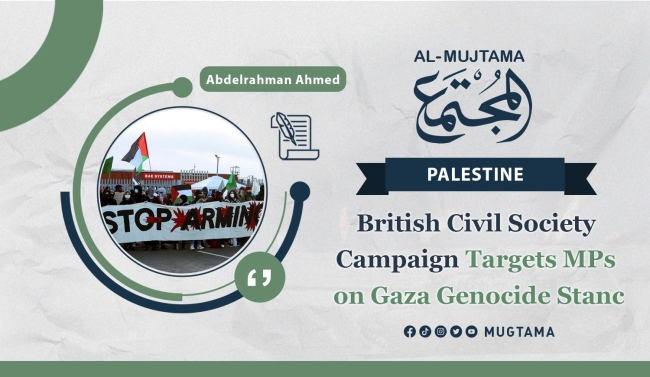British Civil Society Campaign Targets MPs on Gaza Genocide Stance
Several civil society organizations and human rights activists in the UK have launched a campaign named "No Ceasefire, No Vote" aimed at pressuring Members of Parliament (MPs) to support a ceasefire in Gaza. The campaign encourages British citizens to send messages to their MPs, informing them that unless they declare support for a ceasefire, they won't receive their votes.
Thousands of Britons have already participated in this campaign initiated by the "Friends of Al-Aqsa" foundation, aiming to send a substantial number of messages to MPs before a parliamentary session on Thursday to discuss the Gaza ceasefire.
The president of the "Friends of Al-Aqsa" British foundation, Ismaeil Patel, expressed satisfaction with the response to the "No Ceasefire, No Vote" campaign, noting that tens of thousands of Britons had engaged with it within just two days of its launch. Patel anticipates an increase in participation throughout the week, emphasizing the campaign's significance as the UK approaches a general election in the coming year. He stated, "Every MP will fear losing votes in their constituency if they do not support the ceasefire."
Patel underscored the importance of corresponding with MPs, stating, "We are facing a crucial week as the ceasefire will be discussed in the British Parliament. The more pressure we exert on MPs, the more successful we will be in increasing the votes in favor of a ceasefire."
The British human rights activist revealed that the campaign has successfully changed the positions of many British MPs. He expects at least 100 British MPs to vote in favor of a ceasefire, a number that is likely to increase. Surveys indicate that 76% of Britons support a ceasefire, putting British decision-makers and the leadership of the Labour and Conservative parties in an awkward position, acting against popular will and voter preferences.
Patel emphasized, "The campaign has succeeded in changing the stance of many British MPs."
"Don't Be Afraid"
Sabah Al-Mukhtar, the president of the Arab Lawyers Association in the UK, shared his experience in sending a legal message to Prime Minister Rishi Sunak demanding a ceasefire. He also corresponded with an MP from his region, stating, "Every British citizen has the right to express their opinion by contacting MPs and politicians."
Al-Mukhtar affirmed the importance of these letters to MPs, asserting that they inform politicians of the general mood and subject them to the fear of losing electoral votes. From a legal perspective, he urged people not to fear any repercussions, stating that expressing opinions, participating in protests, or corresponding with politicians is legally permitted. He added, "No one should carry ideas from dictatorial countries, fearing arrest or harassment if they express their opinions or contact politicians."
Appealing to all Arabs and Muslims to participate in the campaign, Al-Mukhtar stated, "It is a moral and humanitarian duty. I am confident that it will have an impact, as seen in the dismissal of the British Home Secretary who wanted to ban marches in solidarity with Palestine."
Al-Mukhtar expressed disappointment that many members of the Arab community have not yet overcome passivity and fear of engaging in political discussions. He urged them to participate in the campaign, saying, "This is a serious mistake that allows those with opposing views to dominate the scene without any opposition."
The Importance of Individual Voices
Palestinian journalist Mohammed Amin successfully initiated a dialogue with his parliamentary representative regarding the Labour Party's stance on the Gaza conflict. Amin, expressing his anger and frustration with Labour leader Keir Starmer, who initially supported cutting off water and electricity to Gaza at the beginning of the conflict despite being a lawyer and human rights advocate, decided to correspond with his MP.
Amin received a clear response stating that the party supports Israel's right to self-defense but regrets the civilian casualties. Dissatisfied with the party's stance, Amin warned his MP that his disappointment would translate into not voting for him or his party, urging the Arab community not to vote for the Labour Party.
In a subsequent call, the MP explained the party's position, to which Amin responded by emphasizing that what is happening in Gaza constitutes a war crime. Amin believes that individuals should recognize the importance of their electoral voice, encouraging everyone to pressure and communicate with MPs to convey their perspectives.
Challenging Expectations
Although the parliamentary decision to vote against a Gaza ceasefire is disappointing, it challenges the traditional understanding of unwavering British support for Israeli actions. It highlights the role of grassroots, civil, and human rights movements in the UK opposing Israeli occupation crimes.
In conclusion, the campaign emphasizes the power of individual voices and their impact on shaping political stances. The experiences shared by activists, lawyers, and journalists demonstrate the need for broader civic engagement to influence the political landscape and challenge decisions that diverge from public opinion. The campaign not only targets the immediate parliamentary vote but also seeks to create a lasting impact on the UK's political discourse regarding the Israeli-Palestinian conflict.


